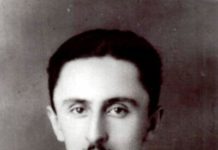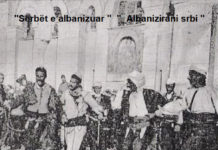Nikoll Loka
Cila ishte e vërteta: Turqia për interesat e saj gjeopolitike vendosi t’i bashkangjitet veprimit ushtarak të NATO-s në minutat e fundit, kur Britania e Madhe dhe Franca kërkuan krijimin e një force ushtarake europiane të ndërhyrjes.
Me kontribut minimal në forcat e NATO-s dhe deri në fund në marrëdhënie miqësore me Serbinë, vetëm duke përdorur fenë për qëllime politike, Turqia ia ka dale të nxjerrë përfitime të mëdha nga Kosova.
Turqia ka mundur të fusë në dorë sektorët strategjikë të Kosovës dhe si kompensim i ka rindërtuar asaj objektet otomane, xhamitë, hanet, çesmat, madje dhe tyrben e sultan Murat Pushtuesit, sikur për ato paska patur nevojë ky vend (!)
Nga ana tjetër, mbështetja në fushën ushtarake, është shoqëruar me kushte absurde për ndryshimin e historisë, deri aty sa turqit të mos konsideroheshin më pushtues (!)
Sylvie Gangloff, Kosovo: Another Dilemma for Turkey, Balkanologie, Vol VIII, Nr.1, Juin 2004
Liderët turq iu përmbajtën qëndrimit për ruajtjen e integritetit territorial të Jugosllavisë dhe ishin jashtëzakonisht të kujdesshëm që të mos ndërhynin në çështjet e brendshme të Kosovës.
Ata u treguan të kujdesshëm që mos të hiqeshin paralele midis problemit të Kosovës dhe problemit kurd.
Liderët turq zyrtarisht kërkuan rikthimin e të drejtave të shqiptarëve, sipas kushtetutës së vitit 1974, që e linin Kosovën nën Serbinë.
Turkish leaders maintained their commitment to the preservation of the territorial integrity of the FRY and were extremely reluctant to intervene in the internal affairs of Kosovo. To reject the parallel with the situation in the southeast of Anatolia, they put forward two kinds of arguments :The repression in Kosovo was on such a large scale that no comparison was possible. President Demirel even called this repression a “ genocide ”.
24 Hürriyet, 13/04/99.
The repression in Kosovo was on such a large scale that no comparison was possible. President Demirel even called this repression a “ genocide. The nature of the conflict was completely different. “ They call them a minority in Kosovo but we do not have minorities in Turkey ”, declared Siileyman Demirel
25 Anadolu Ajansi. 28/04/99.
Turkish leaders were backed, in this approach, by most of the editorialists : “ There is no other state that commits such violence against its own population on its own territory (…) The war between the Serbs and the Albanians is both an ethnic and religious confrontation
26 Milliyet, 26/03/99.
In the proposal the Turkish government made on 16 March 1998 to halt violence in Kosovo, they expr(…)
Turkish leaders officially advocated the “ restoration ” of the rights of the Albanians. By insisting on the restoration of the rights of the Albanians in Kosovo, the Turks avoided any unwelcome comparison with the Kurds (who never had any rights in the past such as those enjoyed by the Albanians in Kosovo under the 1974 Yugoslav Constitution).
Here again, Turkey has followed the path of the United States. The Turkish air force participated in NATO air strikes on the FRY28 and after June 1999, as it had announced very early on, it contributed to the international peacekeeping force stationed in Kosovo. Around 1 000 Turkish soldiers were deployed in Kosovo in July 1999. They are stationed around in Southwestern Kosovo (German sector) where the Turkish community predominantly lives. Around a hundred Turkish policemen were also sent to participate in the “ Interim Civil Administration ”.
29. “ Report of the Secretary-General on the United Nations Interim Administration Mission in Kosovo ”(…)
Last, Turkish coordination offices were opened in Pristina and in Prizren in July 1999 during Ismail Cem’s visit
30. Officially, they were mandated to coordinate the distribution of Turkish humanitarian assistance in the province.
(Vazhdon…)
Dërgoi për publikim, Gjin Musa, gazetar











